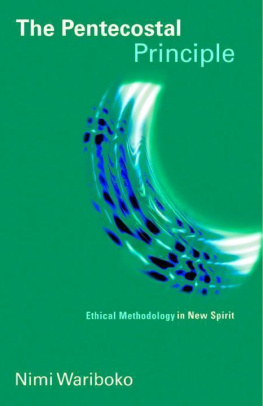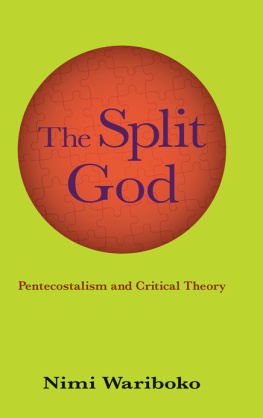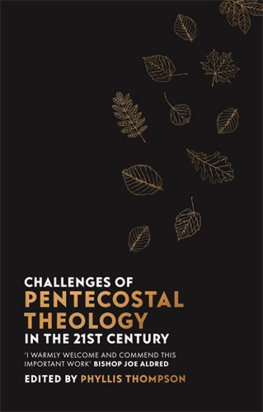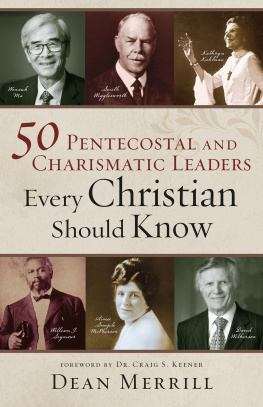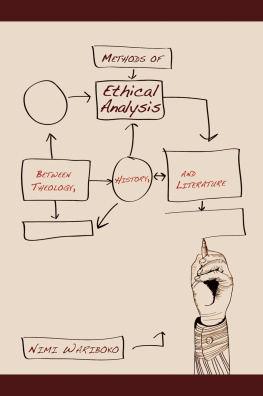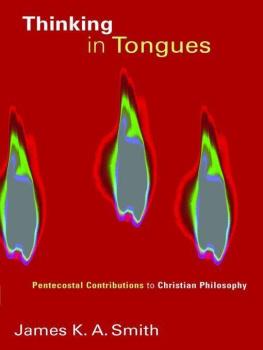James K. A. Smith and Amos Yong, Editors


PENTECOSTAL MANIFESTOS will provide a forum for exhibiting the next generation of Pentecostal scholarship. Having exploded across the globe in the twentieth century, Pentecostalism now enters its second century. For the past fifty years, Pentecostal and charismatic theologians (and scholars in other disciplines) have been working "internally," as it were, to articulate a distinctly Pentecostal theology and vision. The next generation of Pentecostal scholarship is poised to move beyond a merely internal conversation to an outwardlooking agenda, in a twofold sense: first, Pentecostal scholars are increasingly gaining the attention of those outside Pentecostal/ charismatic circles as Pentecostal voices in mainstream discussions; second, Pentecostal scholars are moving beyond simply reflecting on their own tradition and instead are engaging in theological and cultural analysis of a variety of issues from a Pentecostal perspective. In short, Pentecostal scholars are poised with a new boldness:
Whereas the first generation of Pentecostal scholars was careful to learn the methods of the academy and then "apply" those to the Pentecostal tradition, the next generation is beginning to interrogate the reigning methodologies and paradigms of inquiry from the perspective of a unique Pentecostal worldview.
Whereas the first generation of Pentecostal scholars was faithful in applying the tools of their respective trades to the work of illuminating the phenomena of modern Pentecostalism, the charismatic movements, and (now) the global renewal movements, the second generation is expanding its focus to bring a Pentecostal perspective to bear on important questions and issues that are concerns not only for Pentecostals and charismatics but also for the whole church.
Whereas the first generation of Pentecostal/ charismatic scholars was engaged in transforming the anti-intellectualism of the tradition, the second generation is engaged in contributing to and even impacting the conversations of the wider theological academy.
PENTECOSTAL MANIFESTOS will bring together both high-profile scholars and newly emerging scholars to address issues at the intersection of Pentecostal ism, the global church, the theological academy, and even broader cultural concerns. Authors in PENTECOSTAL MANIFESTOS will be writing to and addressing not only their own movements but also those outside of Pentecostal/ charismatic circles, offering a manifesto for a uniquely Pentecostal perspective on various themes. These will be "manifestos" in the sense that they will be bold statements of a distinctly Pentecostal interjection into contemporary discussions and debates, undergirded by rigorous scholarship.
Under this general rubric of bold, programmatic "manifestos," the series will include both shorter, crisply argued volumes that articulate a bold vision within a field as well as longer scholarly monographs, more fully developed and meticulously documented, with the same goal of engaging wider conversations. Such PENTECOSTAL MANIFESTOS are offered as intrepid contributions with the hope of serving the global church and advancing wider conversations.
PUBLISHED
James K. A. Smith, Thinking in Tongues: Pentecostal Contributions to Christian Philosophy (2010)
Frank D. Macchia, Justified in the Spirit: Creation, Redemption, and the Triune God (2010)
Wolfgang Vondey, Beyond Pentecostalism: The Crisis of Global Christianity and the Renewal of the Theological Agenda (2010)
Amos Yong, The Spirit of Creation: Modern Science and Divine Action in the Pentecostal-Charismatic Imagination (2011)
Nimi Wariboko, The Pentecostal Principle: Ethical Methodology in New Spirit (2011)
Ethical Methodology in New Spirit
Nimi Wariboko




viii
There was one Easter; there are millions of Pentecosts.
This book is first and foremost an engaged pentecostal-theological intervention in the methodology of social ethics. Arguing that the pneumatological dynamic is central to ethical methodology, it brings pentecostal experience and ideas into dialogue with the broader academy, with mainstream theological and philosophical scholarships, and other voices outside the tradition. It follows the recent efforts of leading pentecostal theologians to expand the horizon of pentecostal scholarship and to invite those outside the movement to seriously consider pentecostal voices, perspectives, and proposals in their theologies, philosophies, and ethics.
This study formulates the central pneumatological dynamic as the pentecostal principle - the capacity of social existence to begin something new. The pentecostal principle is a synthesis of both the Protestant principle and the Catholic substance and the animating force toward a theonomous connection of culture with the divine depth of existence. On the basis of a rigorous elucidation and defense of the pentecostal principle, I formulate a method of ethics that explicitly thinks through and out of the pentecostal reality. I show how the pentecostal experience and spirituality can be brought into the field of ethical methodology with a serious en gagement with major conversational partners at the vanguard of public theology, social ethics, political theology, philosophy, and ethics in general. In particular, the book is a creative and constructive work on ethical methodology, yet clearly informed by pentecostalism as understood not only in terms of the global movement but also in terms of the Day of Pentecost symbol, and it is consistent with the major thrusts of recent pentecostal academic theology.
The book argues that ethical methodology (engagement) must assume the mode of cultural criticism, social creativity, and political engagement in which we should resist commitment to any knowledge-machinery that only works to understand the world but not to change it, and instead we must provoke moral development, and enact constituting and constituted social practices of human flourishing. An ethics faithful to the pentecostal principle does not allow itself the luxury of bathing in the blithe air of the problematic and vocabulary of past eras and their spirits (specters), but must continuously work to invent its own analyses and language, to speak in new tongues.
Pentecostalism (in its fury, abundant energy, and rapid growth) is the religious archetype of the impetus of our age. Energy is a pure means and pure endedness, if not actually only a pure means (pure mediality).
The notion of energy as a pure means opens up another perspective for comprehending our epoch: economy, politics, and religion. The philos Pentecostalism portrays religion as pure means, a pathway of profanatory (not pejorative: in the sense Agamben uses the term) behaviors. Religion as a sphere of openness, pure means, is profoundly and qualitatively different from religion as an end. Pentecostalism displays the structure of aesthetic categories and the "logic" of play. Pentecostalism is the sacred in a playful mode.

